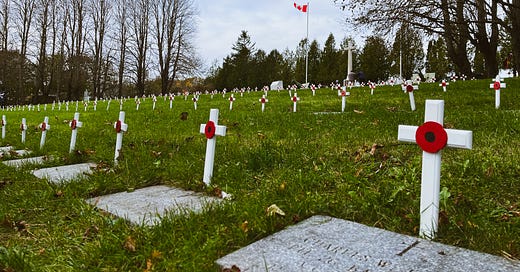Needing little foothold in the earth, the common poppy - Papaver rhoeas - lay dormant for years until the soil is turned over in turmoil and exposes them to the light.1
Some use gardening implements like rakes and hoes to gently till the land, but if you don’t have access to one of these, you can also shell or bomb the landscape to render the terra less firma.
And in little time, the spilled blood of sons and daughters soaks into the loose dirt, disappearing before a new crimson emerges, replacing people with poppies.

Serving from April 1916 to January 1919, William Robinson was dispatched in June 1917 from the scallop fishing village of Digby to the 85th Battalion in France. With little time to acclimate, he soon found himself in Flanders Fields for the Battle of Passchendaele.
No doubt he saw the same crimson-stained fields - from man and flower - as the Canadian surgeon John McCrae, who penned the now-famous Remembrance Day poem.
Unlike McCrae, though, he came back to Canada.

Would the other famous poppy - Papaver Somniferum - have helped William with the pain he brought back as souvenirs?
Having lost a brother in WWI, plus witnessing the loss of countless fellow soldiers, and likely his own livelihood as a labourer with injured hands, he did find some solace in a wife and growing family before the pain became too great.
Or perhaps the opiates found in the seeds of the tissue-thin flower could only alleviate his physical pain, and not the deeper wounds he sustained in Flanders Fields.
Not long after William passed away from his injuries, his son, Douglas, enlisted as a private in the West Nova Scotia Regiment of the Canadian Infantry Corps. Serving from August 1941 to August 1945, it appears that he landed in Silicy and served in Italian campaigns of WWII.
(I say “appears”, because my grandfather’s service records are still tied up in the crimson tape of bureaucracy; judging by my calculations from my initial request and a subsequent one 14 months later, I’m on track to receive them in 2033.)
While I don’t know what physical injuries he may have sustained, or whether any poppies grew in the Italian countryside, he did come home with other injuries that were understandably and continually well-preserved over the years.
He still found spaces to have children and, eventually, teach his granddaughter how to play cribbage.
Poppies don’t grow in the wild here in Canada, at least not Papaver Rhoeas. But with the seeds and loose soil, we can quietly sow peaceful crimson in flower beds.
Until it’s warmer, though, we have to be content with placing our velvet ornaments to brighten up the bunks of the fallen.
In Flanders Fields (by John McCrae)
In Flanders Fields, the poppies blow
Between the crosses, row on row,
That mark our place; and in the sky
The larks, still bravely singing, fly
Scarce heard amid the guns below.
We are the dead. Short days ago
We lived, felt dawn, saw sunset glow,
Loved and were loved, and now we lie,
In Flanders fields.
Take up our quarrel with the foe:
To you from failing hands we throw
The torch; be yours to hold it high.
If ye break faith with us who die
We shall not sleep, though poppies grow
In Flanders fields.
Smithsonian. 9 November 2018. 100 Years Ago, Poppies Became More Than Flowers.






That opener ... wow.